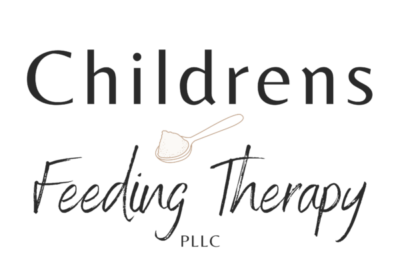
WHAT IS A FEEDING DISORDER?
A feeding disorder is when a child has difficulty with eating or drinking and is not able to take their full nutrition and/or hydration needs by mouth.
What are the symptoms of a feeding disorder?
Children with a feeding disorder can have a wide variety of difficulties. The most common difficulties include:
- Difficulty chewing foods, typically swallowing food in whole pieces.
- Difficulty swallowing foods or refuses to swallow certain types of food consistencies.
- Refuses to eat certain food textures or has difficulty transitioning from one texture to another texture (ex: from bottle feedings to purees, from purees to soft solids or mixed textured foods).
- Gags on, avoids or is very sensitive to certain food textures, food temperatures and/or flavors.
- Struggles to control and coordinate moving food around in mouth, chewing and preparing to swallow food.
- Fussy or irritable with feeding.
- The child seems congestion during feedings or after.
- Frequently coughs when eating.
- Gags and chokes when eating.
- Frequently vomits during or immediately after eating or drinking.
- Refuses or rarely tries new foods.
- Pushes food away.
- Has difficulty transitioning from gastric tube (G tube) feedings to oral feedings.
- Negative mealtime behaviors (infant cries, arches, pulls away from food; child refuses to eat, tantrums at mealtimes or “shuts-down” and does not engage in mealtime).
- Infant demonstrating signs of difficulty with coordinating the suck/swallow/breath pattern during bottle or breastfeeding.
- Feeding time taking longer than 30 minutes for infants, and 30 to 40 minutes for toddlers or young children.
- Known to be a “picky eater” who eats a limited variety of foods or consistencies.
How is a feeding disorder diagnosed?
The child’s caregiver will be asked questions about how the child eats and any problems noticed during feeding. The child’s skills will be observed and compared to what are known to be age appropriate feeding skills.
What Should I expect during feeding therapy?
During feeding therapy, therapists work with children to provide them with the skills they need to make mealtime more enjoyable and nutritious. The skills taught to each child are determined based on the patient’s needs and may differ based on the child’s specific issues. Children in feeding therapy are taught oral skills and introduced to new foods and textures.
What is the parents role in feeding therapy?
Caregivers play an important role in feeding therapy. As a vital member of the child’s care team, therapists stay in close contact with the child’s family so that the therapy techniques provided are the most functional for the child. While the child is learning skills in order to become a better eater, caregivers must learn the skills and strategies they can use at home in order to help the child progress and become a better eater and/or drinker. The child’s caregivers and therapist are a team working together. In order to provide patients what they need at home, therapists teach the child’s caregivers:
- Feeding strategies and general advice for eating at home.
- Strategies for addressing negative mealtime behaviors.
- How to continue encouraging the child to eat the new foods introduced during therapy at home.
- Tactics of how to better bottle or breast feed.
Working as a team, the caregivers and therapist decide which foods to introduce or target during the therapy. This decision includes many factors including the child’s oral skill level (what he or she is able to chew, sip or swallow), the family’s culture and lifestyle choices, the child’s specific nutritional needs and any sensory or food texture experiences the overall therapy is addressing. After sharing a meal with the child and caregiver or observing a meal between the child and caregiver, the therapist may provide feedback and advice on ways to incorporate things being learned in feeding therapy and make the meal more enjoyable.
Book A Phone Consultation
One-on-one, customized support for your baby or toddlers feeding journey.
Whether your baby is refusing a bottle, your toddler is having difficulty chewing, or your kiddo is a picky eater- we want to help! Schedule a 30 minute phone consultation and allow us to help you work through your child’s feeding difficulties.

